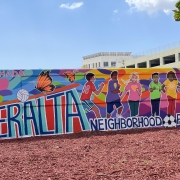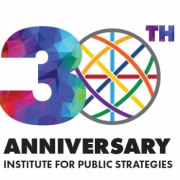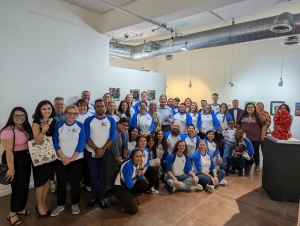IPS Media/GIS Director Participates at GeoGov Summit as a Health Panelist
Event brings together thought leaders in geospatial technology to advance the National Geospatial Infrastructure
ANNAPOLIS, MD, September, 2023 – Media/GIS Director Meredith Gibson recently participated as a panelist for a discussion on the use of geospatial technology in health at the 2023 GeoGov Summit in Herndon, VA. The convening was for experts in government, business, and nonprofit industries to advance geospatial governance and find solutions to connect data and technology across industries and platforms into one national strategy.
“I had the opportunity to talk about geographic information systems (GIS) in healthcare and public health, whether GIS is currently meeting its needs, the challenges, and how we can improve our GIS capabilities,” Gibson said.
The health panel was asked if the GIS community has done enough to develop practical use cases for health. According to Gibson, the COVID-19 dashboard created by Johns Hopkins University is an exemplary use of GIS in public health. Up until earlier this year, it tracked COVID-19 cases across various metrics, including at a geographic scale, on a daily basis.
However, it is clear that more could be done in the health sector to integrate more geospatial technology. According to an analysis by GW Consulting, healthcare and public health do not even make the top 10 of the geospatial market.
“What struck me the most about the summit was how public health and healthcare are behind the curve in leveraging the technology compared to other industries like climate science,” Gibson said. “We all have the same goal – resilient communities – but we could do so much more for individual and population level health with the right resources and partnerships.”
In addition to mapping and analyzing disease hot spots, GIS can be used to identify neighborhoods and populations best served by health interventions; forecast potential health-related trends; conduct environmental scans; coordinate emergency response; pinpoint access to medical and other services; and serve as a community outreach tool.
The conference addressed the priorities of the geospatial industry, such as climate change, civil infrastructure, health, emergency management, defense and space security. Panelists shared ideas around data governance and spatial technology advancements.
Because the pandemic upended all industries across the globe, it’s imperative that the health sector has a seat at the table in determining the path for a national geospatial strategy. Moreover, a national strategy that considers the granular scale and dynamic character of communities, such as the ones IPS works with, will help inform data collection efforts that will have the most impact in terms of population health, safety, and equity.
Gibson is leading the development of IPS’ policy mapping lab, an initiative that provides training and technical assistance to other public health agencies and community coalitions in leveraging GIS to achieve organizational goals.
# # #
Contact:
Meredith Gibson
Institute for Public Strategies
(619) 476-9100 ext. 118
mgibson@publicstrategies.org











